Abstract
Artificial intelligence is revolutionizing the pharmaceutical sector by streamlining the processes of drug discovery and development. By leveraging AI advancements, we can accelerate the identification of new drugs, improve precision medicine approaches, and enhance patient outcomes. In this context, AI plays a crucial role in various aspects of drug discovery, employing algorithms to analyze vast datasets, predict molecular interactions, and identify potential therapeutic candidates. Several innovative applications highlight the influence of AI, including the use of machine learning for drug repurposing and the discovery of new compounds. However, despite its promising contributions, the integration of AI in drug development also faces limitations, which will be explored in the final
Keywords
Artificial intelligence, Machine learning, Alpha fold, drug discovery, drug repurposing
Introduction
Artificial Intelligence (AI) is revolutionizing the landscape of drug discovery and development through its ability to identify molecular targets, optimize lead compounds, design new drugs, repurpose existing medications, and enhance the efficiency of clinical trials. Additionally, AI can predict important physicochemical properties such as solubility, partition coefficients, and permeability, which impact a drug's pharmacokinetics and its interaction with target receptors. By accelerating the drug discovery process, AI can lead to significant cost savings in research and development, ultimately facilitating faster delivery of new treatments to patients. Moreover, researchers can leverage AI for drug design optimization and formulation development. In recent years, there has been a notable surge in interest surrounding the application of AI in medicinal chemistry, with the potential to significantly alter the pharmaceutical sector. With the ongoing digitalization of data in the pharmaceutical industry, there arises a challenge in effectively acquiring, analyzing, and applying this wealth of information to address complex clinical dilemmas. AI encompasses a range of sophisticated tools and networks that emulate human intelligence without substituting the indispensable role of human oversight. The domain of AI incorporates various methodologies, such as reasoning, knowledge representation, and solution searching, with machine learning (ML) being a cornerstone component. AI systems can analyze and learn from input data, enabling them to make autonomous decisions aimed at achieving specific goals. ML algorithms excel at discerning patterns in categorized datasets. Deep Learning (DL), a specialized subset of ML, employs artificial neural networks to realize high-accuracy predictions regarding the efficacy of drug compounds, as highlighted by recent research. The upcoming years are expected to see AI play a pivotal role in the creation of innovative medications and therapies. Various AI techniques are instrumental in drug discovery, including ML for predicting drug properties and optimizing chemical structures; DL for analyzing extensive biological datasets; Natural Language Processing (NLP) for parsing scientific literature to identify drug candidates; Generative Models (GM) for creating new potential drug molecules; and network-based strategies for pinpointing viable targets for drug development. As the utilization of AI continues to expand, it is poised to transform clinical assessments and training practices. Medical professionals have the opportunity to collaborate in the development of AI technologies for the medical and pharmaceutical sectors, ensuring that the promise of AI to enhance healthcare delivery is realized.
DEFINITION:
Artificial Intelligence (AI) is a field within computer science that leverages algorithms, data, and computational resources to develop systems capable of executing tasks that normally necessitate human intelligence.
AI enables machines to learn from experience understand natural language, recognize pattern solve problems and make decisions
OBJECTIVE:
- Accelerating Drug Development: Artificial Intelligence (AI) can analyze vast amounts of data, significantly shortening the time and reducing the costs associated with bringing new drugs to market. It can also assist in identifying promising drug candidates and enhancing the design of molecules.
- Enhancing Clinical Trials: AI can aid in selecting participants for preclinical trials by recognizing biomarkers and anticipating side effects. Additionally, it can forecast the outcomes of clinical trials, thereby minimizing risks to patients.
- Predicting Drug Properties: AI can estimate various physicochemical properties of drugs, including solubility and permeability, which influence how drugs interact with receptors and their pharmacokinetic profiles. It can also project a drug’s bioactivity and safety profile.
- Generating New Molecules: With the application of deep learning algorithms, AI can create novel molecular structures that possess desirable characteristics.
- Improving Drug Repurposing: AI technologies can enhance the strategies involved in repurposing existing drugs for new therapeutic uses.
- Analyzing Drug Combinations: AI can assist in evaluating the effectiveness and compatibility of different drug combinations.
- Role of Artificial Intelligence in Drug Discovery and Development:
Artificial intelligence in drug discovery research aims to identify effective medications for specific diseases by targeting specific proteins associated with those conditions. Researchers traditionally screen molecular libraries to find a molecule that can bind to a specific protein. This identified molecule is then refined through multiple rounds of testing to become a potential drug candidate.
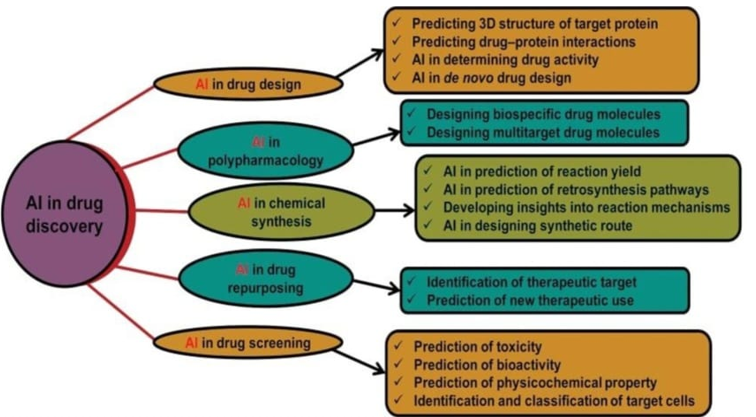
Fig1: AI in drug discovery
Stages of Clinacal Trials:
- Safety monitoring: AI monitors clinical trials data in real time to identify safety concerns and adverse events.
- Patient recruitment: AI can help identity sites and recruit patients for clinical trials.
- Data Analysis: AI can analyze large amounts of data faster than manual methods, helping to produce insights.
- Drug discovery: AI can help speed up the discovery of new drug compounds.
- Clinical trials design: AI can help design more efficient clinical trials by identifying patient populations that are most likely to respond to a treatment
- Resource allocation: AI can help companies make better decisions about resource allocation.
Clinical trials are crucial for the evaluation of drug safety, reliability, and effectiveness. The integration of artificial intelligence (AI) can significantly improve trial processes by facilitating better recruitment, increasing adherence, and enhancing data analysis, which can lead to faster trial completion and improved patient outcomes.
AI has the capability to automate the generation of necessary analytical reports and intelligently interpret the collected data for integration with subsequent systems. The initial phase of clinical trials involves designing the study, where critical decisions include determining appropriate drug dosages, selecting the number of participants, and identifying the data to be gathered. By leveraging AI, researchers can minimize the uncertainty and reduce the manual effort associated with fine-tuning eligibility criteria. Furthermore, AI can also decrease the total number of participants required for a trial while maintaining robustness in results.
1)Patient Retention: Clinical trials often experience challenges with patient retention, as they do not conclude abruptly; dropout rates tend to be significant. For instance, an analysis of 95 clinical trials revealed that nearly 40% of participants discontinued their prescribed medication within the first year. Recent research indicates that artificial intelligence (AI) can be beneficial in addressing this issue. AI can analyze historical data to identify individuals at higher risk of dropping out, allowing clinicians to take preventive actions. Additionally, AI can evaluate videos of patients taking their medications to ensure compliance and prevent missed doses.
2) Putting it together: Artificial intelligence can assist researchers in handling the influx of clinical trial data by extracting information from unstructured reports, annotating images, and lab results, as well as filling in missing data points by predicting values. It can also identify specific subgroups within a population that respond differently to treatments. Additionally, there are AI-powered search engines that enable users to locate relevant text or images in extensive medical documents. Collaborations are underway with pharmaceutical companies interested in utilizing this technology to systematically organize the data collected from clinical trials, including physician notes and pathology images.
Impact of Artificial Intelligence:
The impact of artificial intelligence (AI) on drug discovery is profound, particularly in the area of designing new compounds with desired properties and functions. Traditional drug discovery methods typically involve identifying and modifying existing compounds, a process that can be lengthy and labour-intensive. The introduction of AI-driven tools, such as Alpha Fold, marks a significant advancement in our grasp of biological processes. Alpha Fold is an innovative software platform that utilizes AI to predict the three-dimensional structures of proteins based on their amino acid sequences. This breakthrough in structural biology holds great promise for both personalized. Alpha Fold signifies a major advancement in integrating AI with the fields of structural biology and life sciences. Additionally, machine learning (ML) techniques and molecular dynamics (MD) simulations are being employed to enhance the de novo drug design process, leading to improved accuracy and efficiency. Researchers are exploring the combination of these methodologies to leverage their complementary strengths. Furthermore, the implementation of interpretable machine learning (IML) and deep learning (DL) approaches is also playing a crucial role in this evolution. By harnessing the capabilities of AI and molecular dynamics, scientists can now design drugs more effectively and efficiently than ever before.
Artificial Intelligence Alpha Fold:
Has made significant strides in predicting the structures of proteins that have not yet been experimentally determined. The integration of artificial intelligence into structural biology, particularly through molecular dynamics simulations and the prediction of human protein-protein interactions marks a transformative era for life sciences. While Alpha Fold’s deep learning capabilities have revolutionized protein structure prediction, it does not fully resolve longstanding challenges in protein folding or elucidate the precise folding pathways. Nevertheless, the structures generated by Alpha Fold can serve as valuable resources for predicting the configurations of yet-to-be-characterized proteins. Moreover, Alpha Fold plays a vital role in the emerging field of allosteric drug discovery. This innovative approach focuses on designing drugs that bind to sites on proteins distinct from the orthostatic site, where traditional ligands typically attach at the active site.
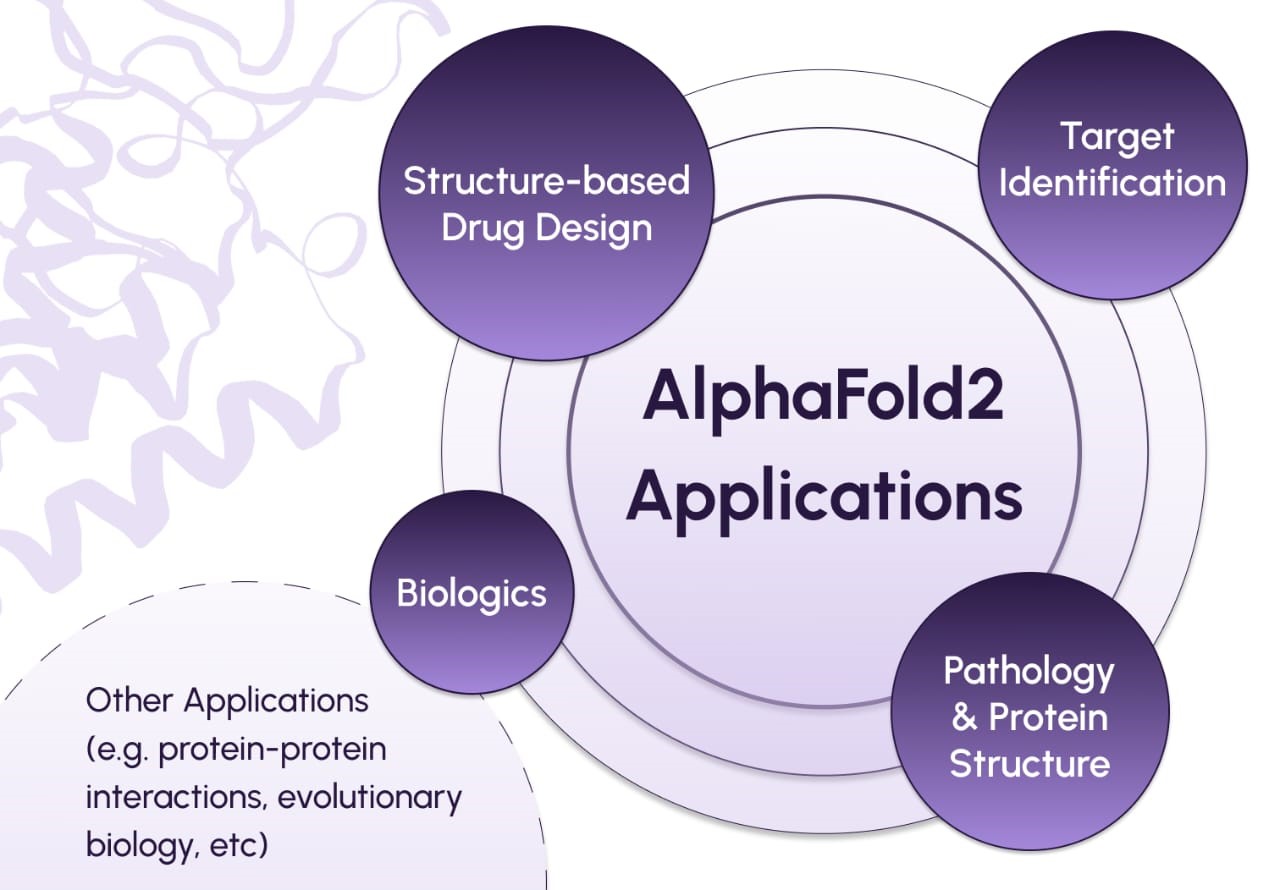
Fig 2: Alpha fold
- Artificial Intelligence in New Drug Discovery:
In the field of medicine, there are two types of following applications – Physical & Virtual.
7.1) Physical applications:
Physical applications include the following.
- Robot-assisted surgery.
- AI-enhanced prosthetics.
- Real-time patient monitoring.
- Automated laboratory process
The use of AI in robot-assisted surgery offers medical professionals’ valuable information to help them make better decisions. Although AI cannot substitute for human doctors, it can significantly enhance their abilities and improve patient outcomes. AI-powered surgical robots allow surgeons to undertake complex procedures with increased precision, control, and flexibility. Additionally, AI-based monitoring systems continuously analyze patient data, including vital signs and electronic health records, to detect potential signs of deterioration or complications. Research has indicated that AI algorithms can outperform human doctors in specific diagnostic tasks, such as identifying certain types of cancer or interpreting pulmonary function
Virtual operation
Virtual operations order together with.
- Individual backing.
- Substantiated treatment plans.
Virtual Health sidekicks
Virtual AI technologies are decreasingly abetting healthcare interpreters in making more accurate and effective complaint judgments. These AI algorithms have the capability to dissect medical imaging data including X- shafts, CT reviews, and MRIs to identify abnormalities, which facilitates early complaint discovery. This advancement significantly lowers the liability of misdiagnosis and leads to bettered patient issues. The strength of AI lies in its capability to exercise and interpret vast quantities of medical information, uncovering patterns that may scape mortal observation. Through this process, AI contributes to enhanced individual delicacy and the expression of customized treatment strategies. For illustration, in gastroenterology, AI has been effective in relating irregular conformations in endoscopic and ultrasound images, including colonic excrescencies. likewise, wearable bias powered by AI can continuously cover cases and deliver real- time information to healthcare providers, therefore enabling timely interventions. These tools have been specifically finagled to descry and advise caregivers about seizures in individualities suffering from epilepsy. also, AI- driven virtual operations can estimate a person’s health profile — encompassing inheritable data, medical history, life choices, and present health conditions — to contrive needlewoman- made treatment protocols. They can also help in medicine discovery by assaying expansive databases of molecular structures, natural relations, and clinical trial results, which expedites the development process of new specifics and holds pledge for accelerating remedial advancements.
• Artificial Intelligence in Drug Discovery Implies
1) Target identification and confirmation
Artificial Intelligence (AI) has made a substantial impact on medicine discovery, particularly in the areas of target identification and confirmation. This process entails chancing implicit natural targets and understanding their places in conditions, followed by attesting that these targets are indeed involved in complaint mechanisms. Confirmation also involves assessing whether modulating the target is likely to produce a remedial effect. AI plays a vital part in this process by assaying genomic, proteomic, and metabolic data to identify implicit medicine targets. Machine knowledge algorithms can dissect vast datasets to determine which proteins or natural pathways are associated with specific conditions, furnishing precious perceptivity to experimenters involved in medicine development. Also, AI supports the target selection process, icing that an optimal target is not only drug able but also safe, effective, and suitable of meeting marketable demands.
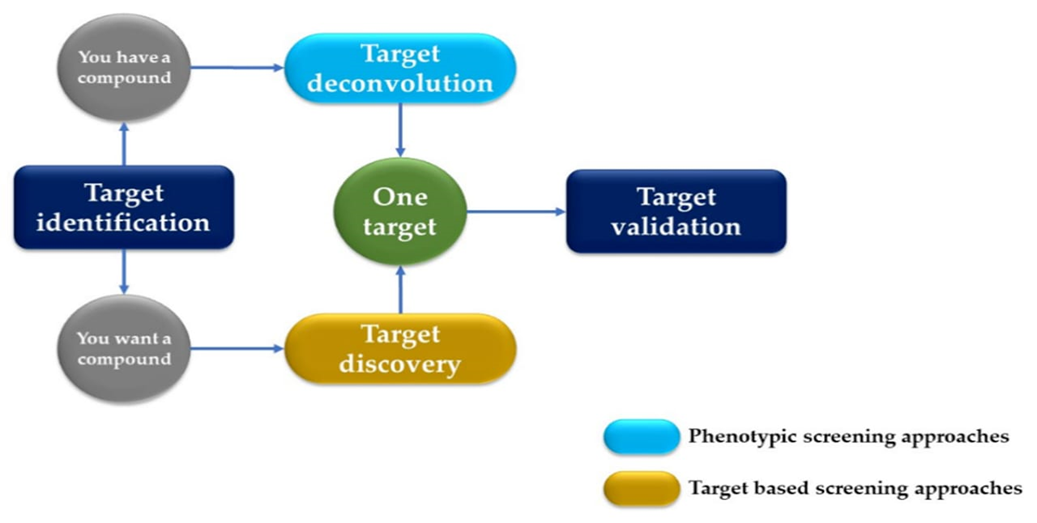
fig 3: Target identification and confirmation
2) Virtual network and drugs design
AI- driven virtual network tools estimate the three- dimensional configurations of target proteins to read the relations between implicit medicine contenders and these proteins. This approach significantly accelerates the medicine design process, enabling experimenters to efficiently identify contenders for farther testing. Virtual medicine network utilizes computational ways combined with AI to assess the effectiveness of prospective medicines by matching chemical structures to natural targets. Through the analysis of molecular structures, AI algorithms can estimate binding affections and prioritize composites for experimental evaluation. This methodology facilitates the rapid-fire- fire- fire- fire- fire testing of medicine mixes for their capability to bind to and inhibit specific receptors or enzyme targets.
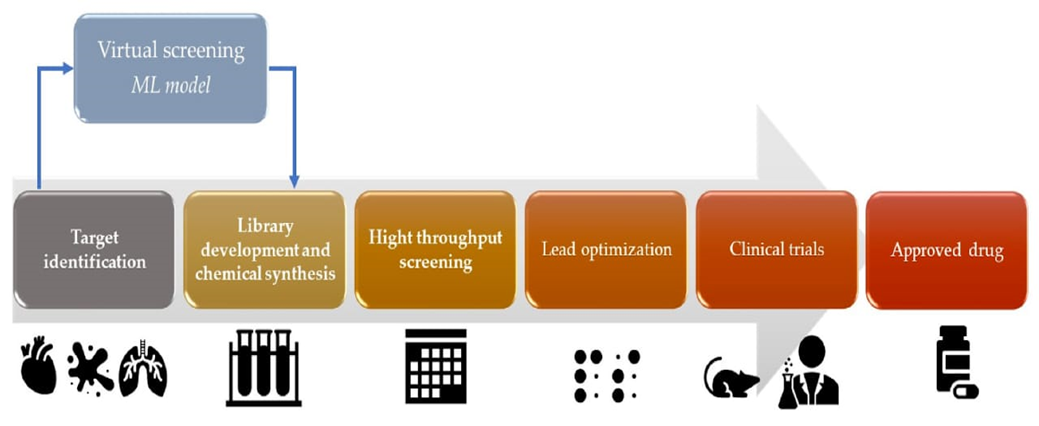
Fig 4: virtual network and drugs design.
3) Repurposing of being medicines
Artificial Intelligence (AI) has the implicit to help experimenters in discovering new remedial uses for being medicinals by fully examining expansive medicine- target relations and complaint pathways. This strategy for medicine repurposing can extensively dock the timeline and lower the costs associated with bringing a medicinal to request. In the realm of medicine combinations, AI facilitates bettered identification of synergistic goods, optimization of combinations, substantiated remedy approaches, and the foretelling of possible adverse medicine relations. likewise, AI algorithms can exercise complex natural data to uncover promising synergistic combinations of medicines.
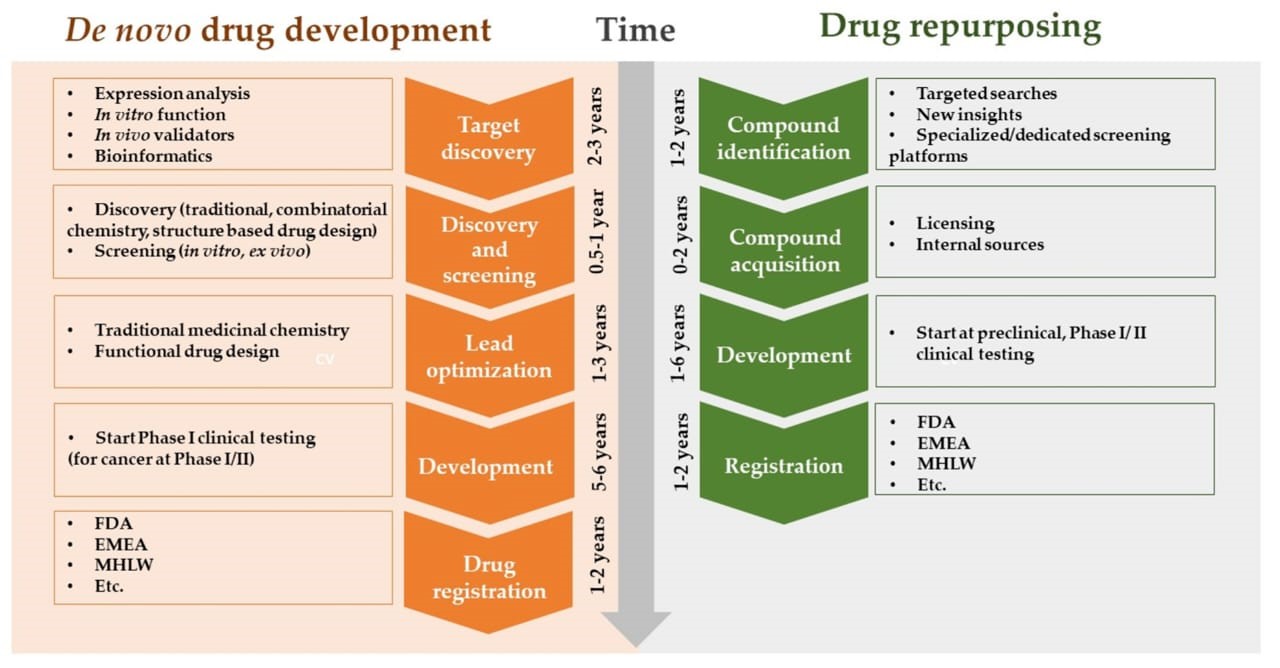
Fig 5: Repurposing of being medicines
• Artificial Intelligence Fashion Used in Material Discovery
AI methodologies, particularly in the realm of paraphernalia wisdom, are decreasingly abused for the discovery and design of new paraphernalia with specific asked characteristics. This approach is largely applicable in the field of medicine discovery, which constantly necessitates the identification of new composites flaunting targeted natural goods. AI algorithms, known for their proficiency in prognosticating the parcels of new paraphernalia, can also be employed to read the pharmacological attributes of implicit medicine contenders. In medicine discovery, the choice and performance of AI ways should be problem- acquainted to insure their effectiveness. Among the current AI styles in discovery are
- Supervised Learning styles Supervised learning entails training models using input data that's labelled, enabling these models to classify or anticipate issues for new datasets. In this terrain, the affair is generally a specific property( similar as band gap or thermal conductivity). Through the patterns learned during the training phase, these models can latterly prognosticate the parcels of strange paraphernalia.
- Unsupervised knowledge Methods Conversely, unsupervised knowledge focuses on assaying unlabelled data to uncover patterns and connections within that data. In medicine discovery, these ways can be employed to explore the chemical terrain of implicit medicines or to identify new paraphernalia. Specifically, clustering styles can be employed to group mixes with analogous parcels, thereby abetting in the discovery of innovative medicine contenders.
Artificial Intelligence Algorithmsin Drug Discovery and Development:
In the realm of drug discovery, traditional methodologies primarily rely on manual research, experimentation, and testing. In contrast, AI-driven approaches leverage data analysis, machine learning (ML), and rapid simulations to enhance the process. Machine Learning (ML): Machine learning encompasses a variety of algorithms designed to identify patterns and make predictions based on data inputs. These algorithms usually focus on structured data and necessitate some form of feature engineering to be effective. Deep Learning (DL): Deep learning is a specialized subset of machine learning that utilizes artificial neural networks to derive data representations. Unlike traditional ML, deep learning models possess the capability to automatically learn features from raw data, which means they can work with unstructured data types such as images, text, and sequences without requiring extensive pre-processing. Natural Language Processing (NLP): A vital AI technique in drug discovery is natural language processing, which involves the analysis of human language. NLP algorithms can distil useful information from a variety of textual resources, including scientific publications, patents, and clinical trial datasets. Text Mining: Text mining effectively uncovers existing drugs that might be beneficial for other therapeutic uses. By scrutinizing scientific literature, AI systems can identify drug candidates that demonstrate efficacy against particular diseases, facilitating drug repurposing efforts. Transfer Learning: Transfer learning is another significant AI strategy applied in drug discovery. This method allows researchers to adapt pre-trained models—originally developed using large datasets—to specific tasks or properties with relatively smaller datasets. Essentially, transfer learning employs knowledge acquired from one area to enhance performance in another related domain, even when data is limited. Active Learning: Conversely, active learning focuses on strategically selecting the most informative samples for testing or simulation. By identifying which materials to prioritize in experimentation, this approach can drastically reduce the number of tests needed, streamlining the discovery process. The integration of these AI techniques into material discovery has led to remarkable advancements in drug development, showcasing the transformative potential of artificial intelligence in this field.
- Example of Artificial Intelligence:
- Cancer Treatment: Artificial intelligence is advancing our pursuit of a new category of therapies known as personalized cancer vaccines. These vaccines aim to train the immune system to recognize proteins produced by tumours that arise from specific mutations, referred to as neoantigens.
- Novel Antibiotic Discovery: Machine learning algorithms have proven effective in uncovering new inhibitors for specific proteins. One example includes the identification of novel inhibitors for beta-secretase, a protein linked to the progression of Alzheimer’s disease. Thus, AI has shown promise in discovering new antibiotics as well.
- COVID-19 Therapeutic Research: In the realm of COVID-19, machine learning algorithms were utilized to sift through extensive datasets of potential therapeutic compounds, identifying those with the most promise for treating the virus.
- Ebola Drug Discovery: The AI-based drug discovery platform Atomise successfully identified a promising candidate for an Ebola treatment within days.
- INSO18-055: In silico Medicine, a biotech firm located in Hong Kong, developed the first-ever AI-designed small molecule inhibitor aimed at treating fibrosis.
- Read Across Structure Activities Relationship (RASAR):
RASAR is a method employed to evaluate the toxicity of unknown chemicals by establishing correlations between a molecule’s structure and its potential toxicological characteristics.
- Advanced Applications Of Artificial Intelligence:
AI-driven Nano robots designed for drug delivery. The role of AI in predicting drug interactions, including synergism and antagonism. The rise of AI in the field of Nano medicine.
- AI-Powered Nano robots for Drug Delivery:
Nano robots are primarily composed of integrated circuits, sensors, power sources, and secure data storage, all maintained through advanced computational technologies. They are specifically programmed to navigate, identify targets, attach to them, and facilitate elimination from the body. Recent advancements in Nano and micro robotics have enhanced their ability to reach targeted sites by responding to physiological conditions, such as pH levels and other variables.
- AI in Combination Drug Delivery and Interaction Prediction:
Several drug combinations are approved for market use to treat complex diseases, including tuberculosis and cancer, due to their potential for synergistic effects that can lead to quicker recovery times. For instance, cancer treatments often involve multiple drugs administered together for optimal efficacy.
- The Emergence of AI in Nano medicine:
Nano medicine leverages nanotechnology and medicinal applications for the diagnosis, treatment, and monitoring of intricate diseases like HIV, cancer, malaria, asthma, and other inflammatory conditions. The integration of nanotechnology and AI has the potential to address numerous challenges in formulation development.
• Limitaions Of Artificial Intelligence
- delicacy: AI tools demonstrate a maximum vaticination delicacy of around 80, and their trust ability decreases further when it comes to prognosticating protein- RNA relations.
- translucency the complexity of AI algorithms can render them opaque, making it challenging for the medical community to completely trust and accept their findings.
- Lack of Creativity AI lacks the capacity for mortal- suchlike creativity and emotional understanding, limiting its capability to introduce in ways that a mortal expert might.
- Data Quality The performance of AI models is directly tied to the quality of their training data. However, defective, or deficient, If the data is poisoned.
- Regulatory enterprises The integration of AI into medicine discovery raises ethical and nonsupervisory questions, particularly regarding how to regularize the AI development process and how to insure the safety and efficacity of its prognostications.
- Phase Limitations AI’s operation is frequently confined to specific stages of medicine development, similar as target discovery and medicine- target commerce analysis. also, if the training data is inadequate, AI may induce incorrect prognostications or “ visions. ”
- Collaboration Challenges The effective application of AI in medicine discovery can be hampered by difficulties in fostering collaboration among colorful stakeholders.
CONCLUSION:
The future of AI in drugstore is largely promising, with multitudinous possibilities for metamorphosis. Areas similar as individualized drug, medicine discovery, drug operation, force chain logistics, patient comforting, and pharmacovigilance are anticipated to suffer significant changes due to AI advancements. Specifically, AI can enhance the medicine discovery process by adding effectiveness and perfection, speeding up the development timeline, and easing the creation of further effective and customized curatives. still, the successful operation of AI in medicine discovery is dependent on the vacuity of high- quality data, the addressing of ethical enterprises, and the recognition of the limitations of AI- grounded approaches.
REFERENCES
- Malik Paras, Pathania Monika,Rathaur Kumar Vyas.Overview of artificial intelligence in medicine.Journal of Family Medicine and Primary Care 2019;8(7):2328-2331.
- Yoon Hyun Jin,Jeong Young Jin,Kang Hyun,Jeong Ji Eun,Kang Do-Young. Medical Image Analysis Using Artificial Intelligence. Progress in Medical Physics 2019;30(2):49-58.
- Wu,Jia PhD;Chen,Jiamin MD;Cai,Jianting PhD.Application of Artificial Intelligence in Gastrointestinal Endoscopy.Journal of Clinical Gastroenterology 2021;55(2):110-120.
- Nussinov Ruth,Zhang Mingzhen,Liu Yonglan and Jang Hyunbum.AlphaFold, Artificial Intelligence(AI), and Allostery.The Journal of Physical Chemistry B 2022;126(34):6372-6383.
- Paul Debleena,Sanap Gaurav,Shenoy Snehal,Kalyane Dnyaneshwar,Kalia Kiran. Artificial intelligence in drug discovery and development.Drug Discovery Today 2021;26(1):80-93.
- Kaul Vivek,Enslin Sarah,Seth A. History of artificial intelligence in medicine.Gastrointestinal Endoscopy 2020;92(4):807-812.
- Ramesh A.N. Artificial intelligence in medicine.Annals of The Royal College of Surgeons of England 2004;86(5):334-338.
- Wirtz Bernd W. Artificial Intelligence and the Public Sector -Applications and Challenges.International Journal of Public Administration 2019;42(7):596-615.
- Francisco Beneke,Mark-Oliver Mackenrodt. Artificial Intelligence and Collusion. International Review of Intellectual Property and Competition Law 2019;50(1):109-134.
- Zhuang Dylan,Ibrahim Ali K. Deep Learning for Drug Discovery: A Study of Identifying High Efficacy Drug Compounds Using a Cascade Transfer Learning Approach.Applied Sciences 2021;11(17):7772.
- Greenhill Alexandra T., Edmunds Bethany R. A primer of artificial intelligence in medicine. Techniques and Innovations in Gastrointestinal Endoscopy 2020;22(2):85-89.
- Gomez-Bombarelli Rafael,Wei Jennifer, Duvenaud David,Hernandez-Lobato Jose Miguel. Automatic Chemical Design Using a Data-Driven Continuous Representation of Molecules. American Chemical Society 2018;4(2):268-276.


 Zaware Roshani *
Zaware Roshani *
 Sakshi Hase
Sakshi Hase





 10.5281/zenodo.14811170
10.5281/zenodo.14811170